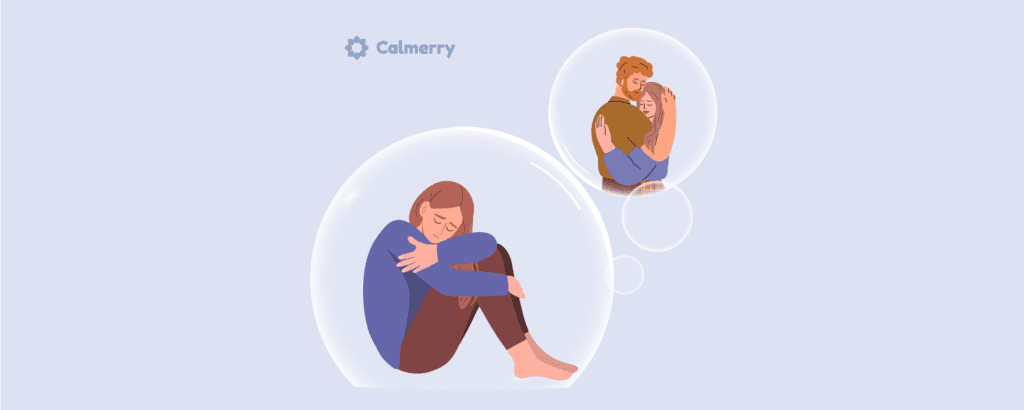Climbing the Love Peak: Why Am I Attracted to an Emotionally Unavailable Man or Woman?

In this article
The paradox of being attracted to emotionally unavailable people.
Here you go again: you feel drawn to someone who’s unavailable—a hard nut to crack. They exude vibes of mystery and aloofness you can’t get close to. And you can’t help but keep trying to conquer their attention!
Or, you seem to have found your soulmate. You both feel emotional and sexual chemistry. And you both see a clear perspective of starting a relationship. But they always avoid talking about their feelings and retract right before the important step.
Can you relate to any of these stories? We’ve shared them not to blame or shame you. Many of us are drawn to emotionally unavailable people and favor them over those who are caring, vulnerable, and easy to get close with.
If you repeatedly fall for another emotionally unavailable person who can’t or doesn’t want to reciprocate, there might be a reason why you’re drawn to unavailable partners. Talking with a Calmerry therapist can help you uncover these patterns and build healthier, more fulfilling connections.
Common signs of an emotionally unavailable man and woman
Emotional unavailability is a coping defense mechanism that manifests in different ways. You won’t find the term “emotional unavailability” in any diagnostic psychology manual. But it denotes the real way people build relationships with others and themselves.
An emotionally unavailable man or woman creates barriers to intimacy. They build protective walls between their feelings and others and keep an emotional distance. Unavailable people also tend to withdraw from their emotions and eventually can’t or don’t want to handle those of others.
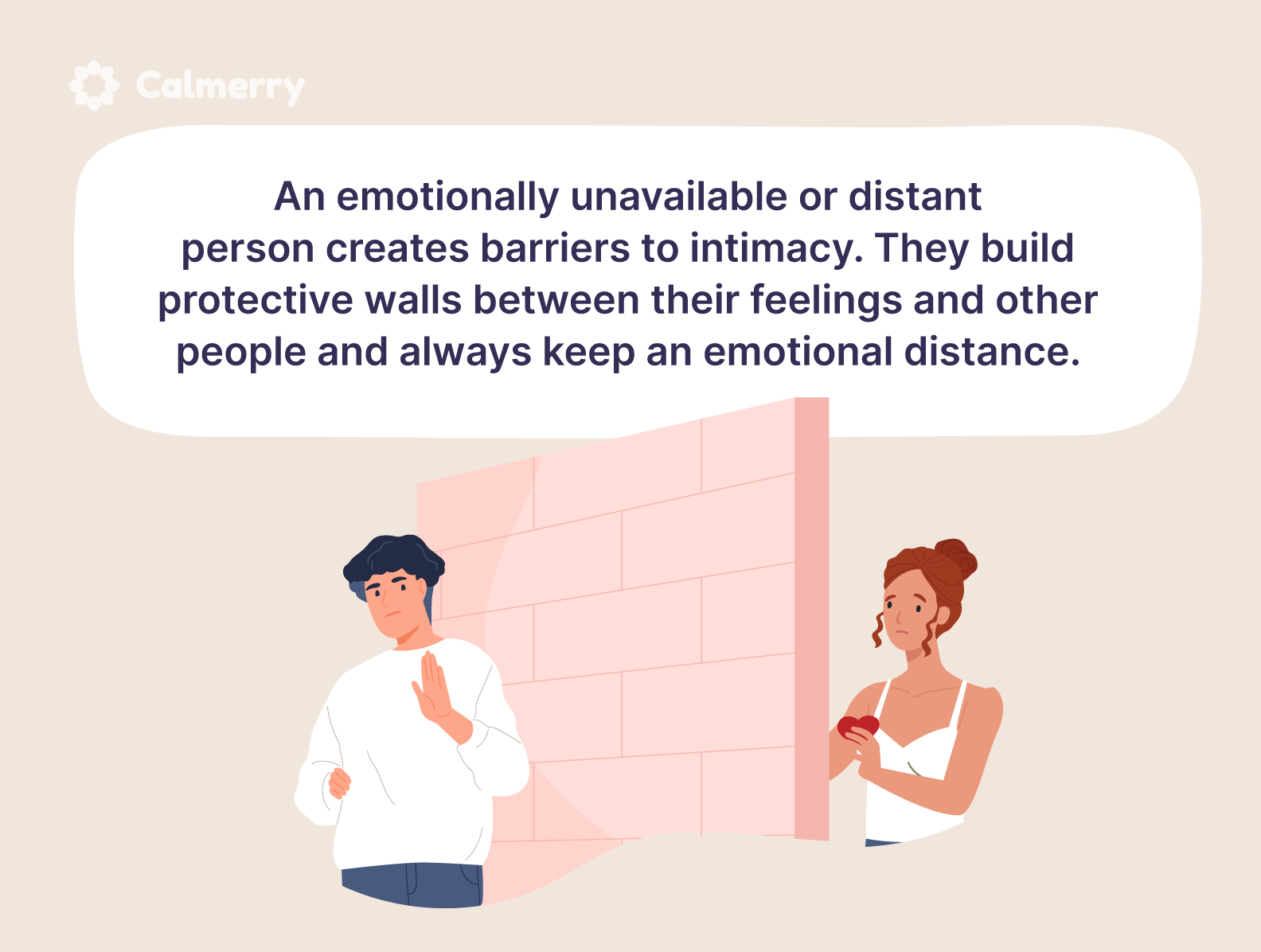
Misconceptions about emotional unavailability
Let’s challenge them real-quick:
- Emotional unavailability isn’t about the inability to love or fall in love
- It can impact all types of relationships and happen at any age
- Its signs may overlap with narcissistic personality disorder, but they aren’t the same thing
- Not only men develop emotional unavailability—women often struggle with it too
- Emotional availability isn’t “feminine stuff”
- Unavailable men and women can build deep emotional connections and create families
- They are absolutely able to care about others and miss them
Signs someone is emotionally unavailable
The signs of emotional unavailability may be subtle and look different depending on the situation.
So, how do you know whether somebody is emotionally unavailable? Here are some signs to look for in both men and women:
- You feel like you must always be perfect to keep them interested
- You feel like you’re climbing Mt. Everest every time you try to get close to them
- It’s you who do all the calling, texting, and planning
- They don’t communicate consistently
- They struggle with being affectionate
- They become awkward when you get physically close
- They change the subject or switch to “light” or superficial topics when you start going deeper or discussing relationship dynamics
- They don’t feel comfortable venting or giving you space to share your experiences
- They’re not living fully in their feelings and emotions
- They may lack emotional support and empathy
- They put off labeling your relationship or won’t commit to the next step
- They become uncomfortable when you express your affection and care for them
- They drop a relationship completely at the first sign of closeness
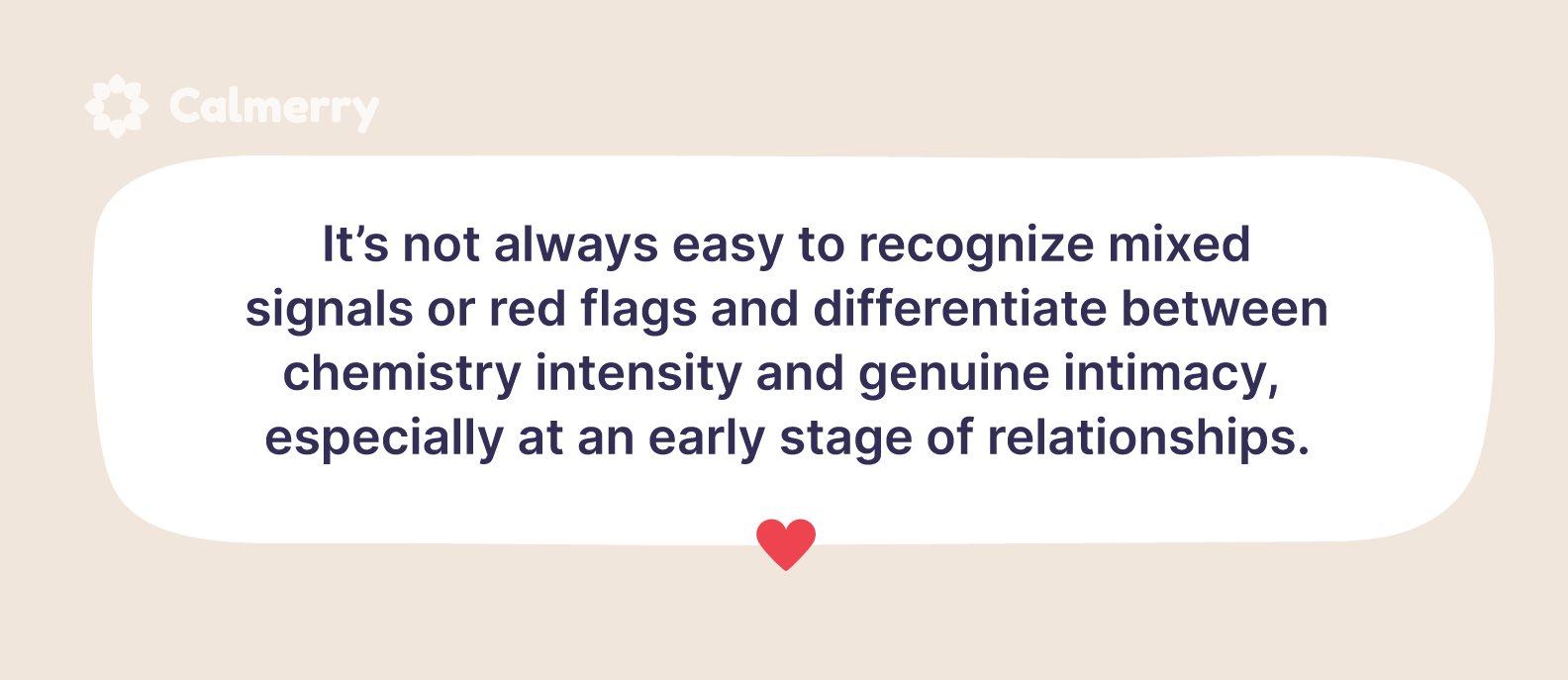
“Often, we face someone’s emotional unavailability when we get acquainted with them closer, while sympathy may come earlier,” — says Oksana Levchuk, a certified Gestalt therapist, “We’re attracted to a person by some of their traits, appearance, or the way they communicate… In closer communication, they may be alienated, avoiding, and unable to nurture intimate relationships.”
The impact of relationships with emotionally unavailable men or women
Being drawn to unavailable, hard-to-read people is common. But you probably know how frustrating, painful, utterly lonely, or even unbearable it may be not to be able to connect with the person you like fully.
Relationships with unavailable men or women typically follow patterns where one partner (usually the emotionally available one) constantly seeks deeper connection while the unavailable partner maintains control by keeping distance. This imbalance creates a sense of insecurity and can lead to:
- Chronic frustration and unfulfilled emotional needs
- One-sided relationships where you’re giving much more than receiving
- A lack of emotional connection despite physical intimacy
- Difficulty building trust and openness
- Relationship anxiety and constant uncertainty about where you stand
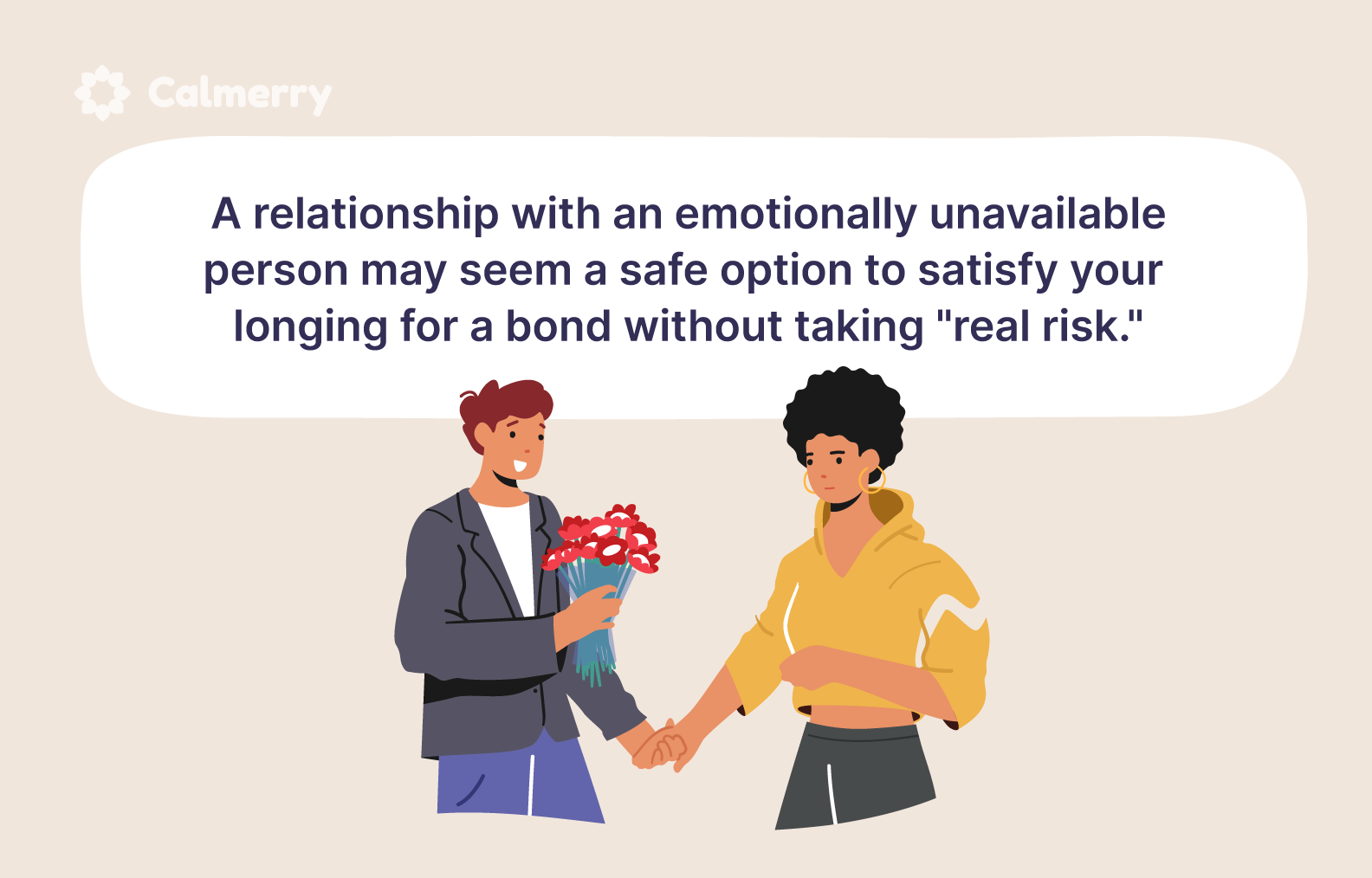
Psychotherapist Oksana Levchuk explains, “With an emotionally unavailable person, it’s impossible to build a relationship characterized by openness, honesty, and vulnerability. They can’t get truly intimate, and you might not want to because losing a fully-fledged, warm, and deep relationship would be unbearable. Thus, paradoxically, by avoiding painful experiences that might or might not happen somewhere in the future, you decide on having no less painful relationships in the present.”
Psychological reasons for this attraction
So why do you keep choosing unavailable men or women? Why do people seek out relationships with those who can’t provide closeness? Why are women drawn to emotionally unavailable men? And why do you attract another emotionally unavailable person? Some of these reasons may resonate with you.
Attachment styles: How childhood experiences shape adult relationships
If you find yourself constantly choosing unavailable partners, you may be repeating a familiar dynamic from your childhood. Perhaps one or both of your parents were neglecting or physically and emotionally distant from you or one another. [1] Saunders, H., Kraus, A., Barone, L., & Biringen, Z. (2015). Emotional availability: theory, research, and intervention. Frontiers in Psychology, 6. https://doi.org/10.3389/fpsyg.2015.01069
Growing up in an environment where emotional unavailability was the norm can lead you to unconsciously seek out similar patterns in adulthood. This defensive strategy is called repetition compulsion—you try to heal your childhood wounds by chasing a distant partner, hoping to rewrite the past and finally receive closeness and connection that was withheld.
Fear of emotional intimacy: Subconscious avoidance of deeper emotional connections
The harsh but highly likely truth: you may be seeking out emotionally unavailable partner because some part of you has a fear of intimacy and commitment. That’s not something that makes you a bad person or partner. Rather, these are deeply ingrained fears of closeness, engulfment, rejection, or getting hurt. You might be afraid of getting emotionally intimate or fall in love with someone. [2] Fritscher, L. (2024, January 12). Fear of intimacy: Signs, causes, and coping strategies. Verywell Mind. https://www.verywellmind.com/fear-of-intimacy-2671818
And there can be many reasons why you developed them. Perhaps, it has to do with past trauma. But these fears make you favor cold distance over warm connection and “safe” relationships over fulfilling ones, despite your desire to commit.
Psychotherapist Oksana Levchuk explains, “With an unavailable person, it’s impossible to build a relationship characterized by openness, honesty, and vulnerability. They can’t get truly intimate, and you might not want to because losing a fully-fledged, warm, and deep connection would be unbearable. Thus, paradoxically, by avoiding painful experiences that might or might not happen somewhere in the future, you decide on having no less painful relationships in the present.”
Low self-esteem: Seeking validation from distant partners
It’s common for people with negative self-image and low self-esteem to have problems receiving unconditional love. Perhaps you were brought up by distant parents whose behavior taught you that love is conditional. You learned that you must do your very best to be worthy of it.
In other words, you learned to “earn” love, not receive it. And unless you earn it—the love isn’t real. Unless you struggle—your self-worth isn’t valid.
That’s why you may push away those who are emotionally available. And that may be why you subconsciously choose unavailable men—their distance opens a battlefield where you try to win their thoughts and feelings over.
Another aspect is that you may unconsciously believe you’re unworthy of love. So you try to overcompensate and over-give to someone emotionally disconnected, smothering them with attention and affection because it seems easier to focus on someone else instead of taking care and giving love to yourself.
Familiarity and past experiences: Repeating unhealthy relationship patterns
Relying on psychological projections and then going through disillusionment is a disappointing experience that has a chance to turn into a vicious circle. Here’s how the tricky game goes:
“Let’s say, someone attracts you with their beautiful shoulders, a shared sense of humor, or similar political beliefs. So far, this is all you know about them. Then, you make attempts to get closer and communicate more. Everything seems to be perfect and exciting, but should you cross into the emotionally or physically intimate territory, you start noticing their detachment, closedness, and weak intention to connect. You get confused, not knowing what has happened. And since unavailable people experience difficulties with direct communication, they are unlikely to say what the matter is openly.
Where there’s not enough information, your mind seeks to complete the picture based on the details it already has. Eventually, you can, for years, explain the coldness of a partner with special qualities that are attractive to you, which they actually don’t possess. This is until you face reality: they can’t and don’t want to build intimacy and stay in emotionally involved relationships simply because they’re the way they are.
– Oksana Levchuk, Gestalt psychotherapist.
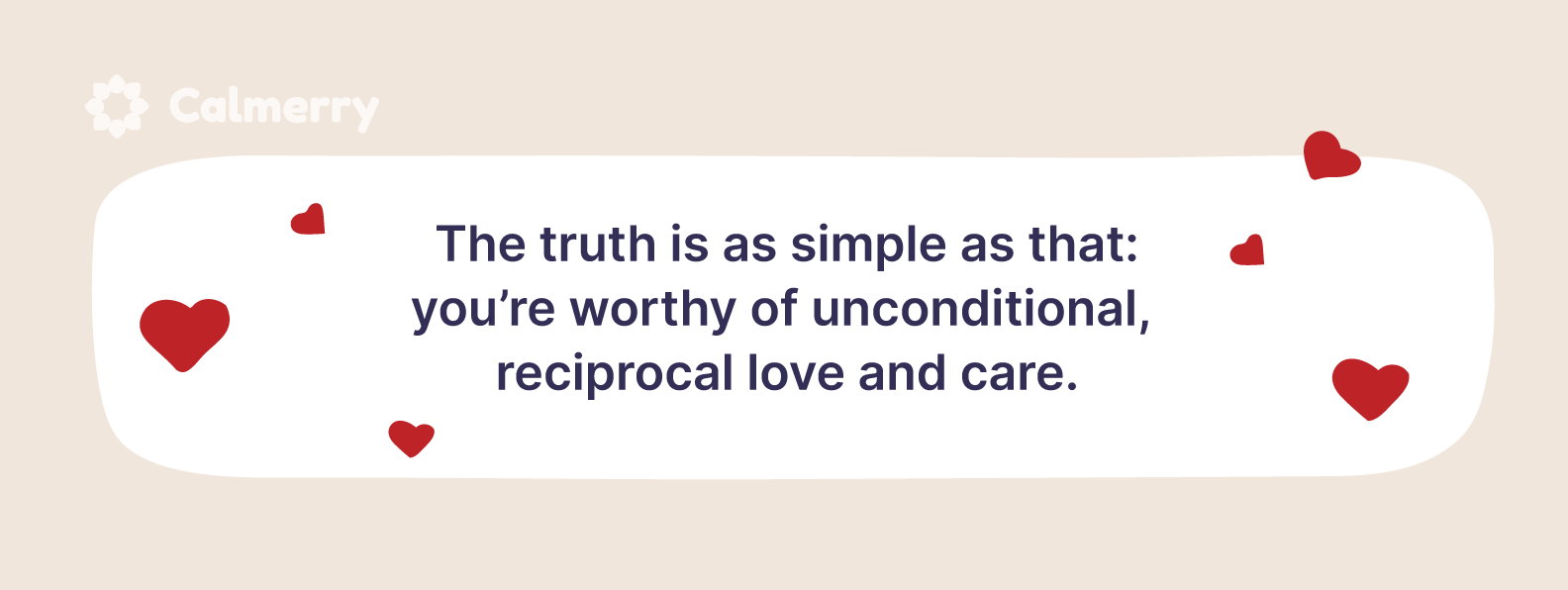
The role of society and media
Romanticization of unattainable love in movies and books
Our culture is saturated with stories that romanticize the pursuit of unavailable partners. From classic literature to modern romantic comedies, we’re taught that “true love” means chasing someone who won’t commit until they finally have a change of heart. Psychology Today and other publications have noted how these narratives shape our expectations about relationships.
The “challenge” of winning over someone who doesn’t want to commit becomes a measure of love’s authenticity. This romanticization creates unrealistic expectations about what healthy relationships should feel like—suggesting that easiness equals boredom and struggle equals passion.
Cultural influences on relationship expectations
Cultural messages sometimes reinforce the idea that unavailable men usually make more desirable partners, while women who are emotionally distant are mysterious and alluring. These stereotypes can lead people to mistake emotional unavailability for desirable independence or strength.
Society often emphasizes the pursuit over the relationship itself, with women often socialized to value the chase and men taught to maintain emotional distance as a sign of masculinity.
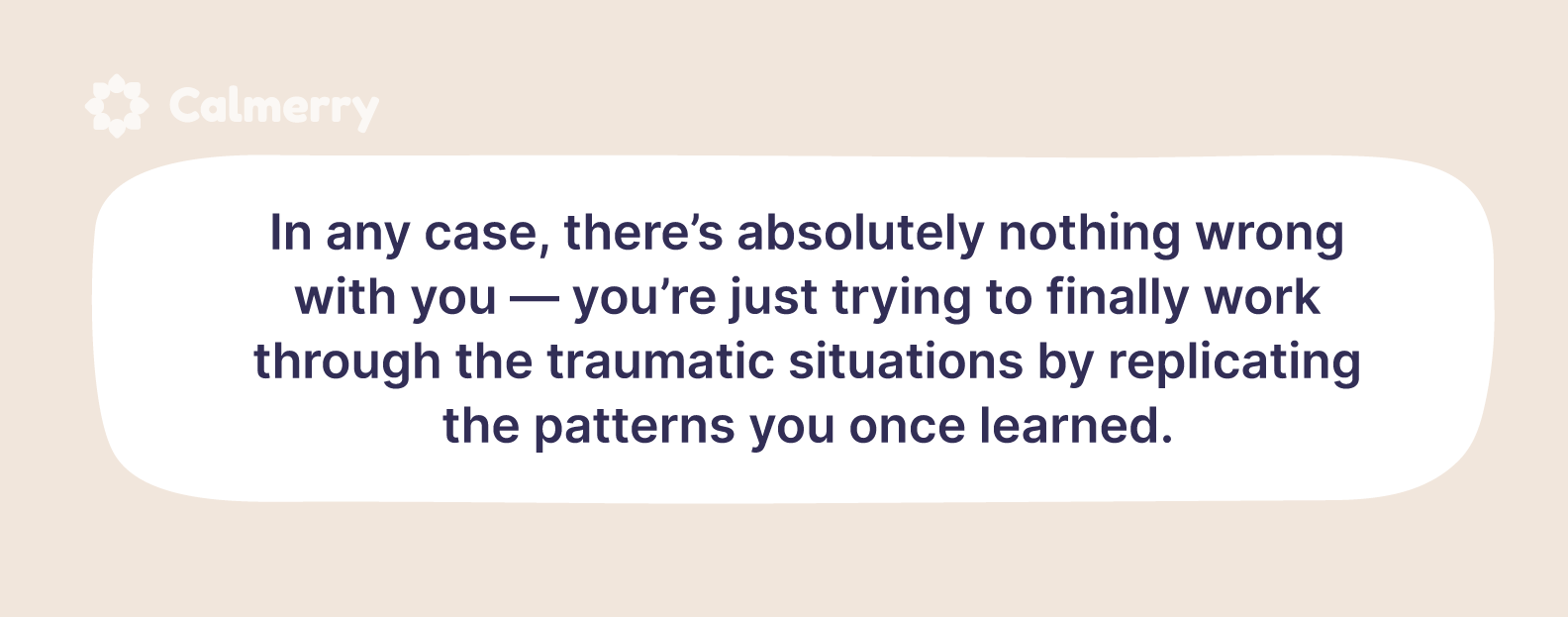
The “challenge” factor and the thrill of pursuit
Forbidden fruit is so much sweeter. That alluring mystery vibe that someone who seems unavailable can create gives you a sense of control when pursuing them. The thought that you have the power to win over an unordinary person, to crack the code, evokes thrill and excitement.
But the psychotherapist warns, “There’s a risk that this person may become a way for us to satisfy our triumph-starved ego, and the relationship (if it happens) will become just a trophy, a symbol of our victory.”
Furthermore, any little sign of their attention—a compliment, a night text, a like on your social media post, a short date—becomes an exhilarating signal that you’re on the “right path.” Such irregular encouragement is called intermittent reinforcement. Consequently, it motivates you to push yourself even harder and fall back into the pattern of codependency.
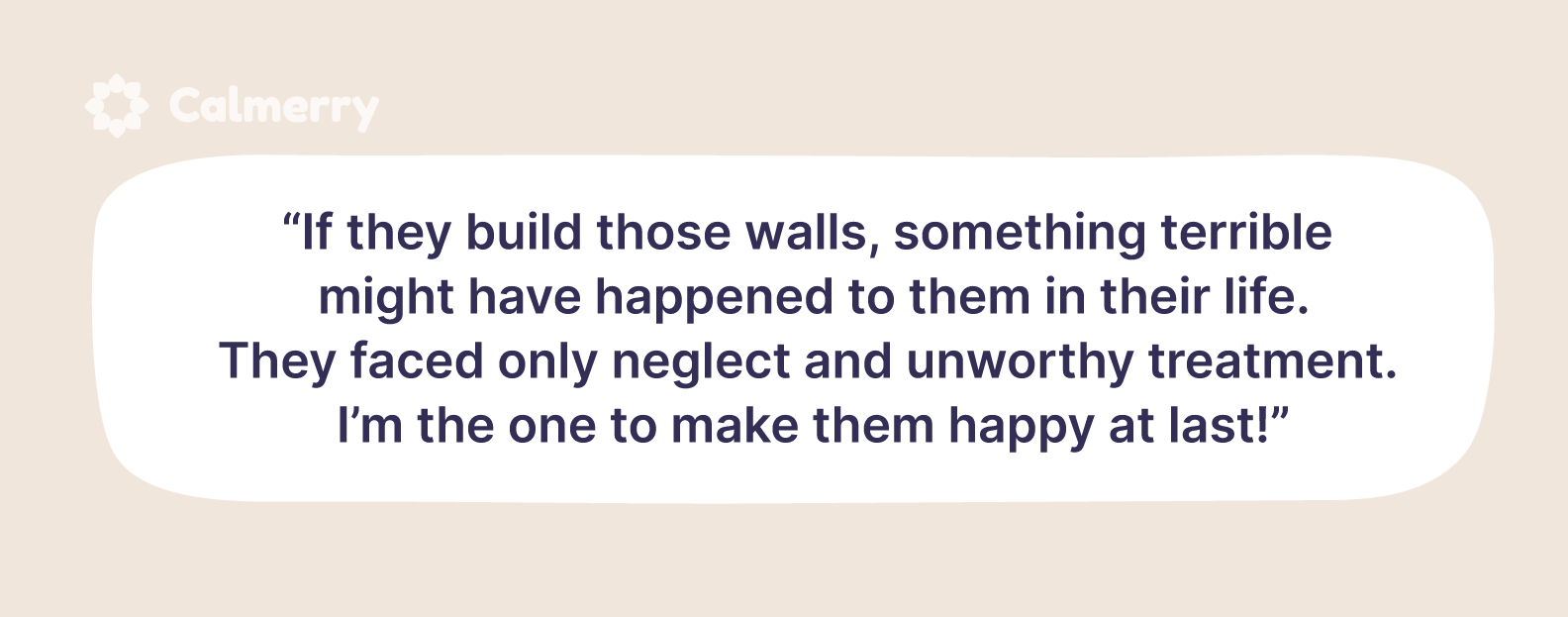
Consequences of pursuing emotionally unavailable partners
Emotional frustration and unfulfilled needs
Relationships with unavailable men or women lead to profound loneliness even when you’re not physically alone. The constant lack of emotional engagement creates a persistent sense of emptiness and unfulfillment.x
Your need for emotional connection, sharing, and intimacy remains unmet, creating chronic frustration. Many people describe it as “emotional starvation”—being with someone yet feeling completely unseen and unheard.
Damage to self-worth and confidence
Continually seeking approval, affection, and commitment from someone who can’t or doesn’t want to provide it creates a pattern of behavior that erodes your self-esteem over time.
You might begin to internalize the message that you’re not worth emotional investment, feeling unworthy of love. This damage to self-worth can persist beyond the relationship, affecting how you approach future connections. The connection can lead to a negative cycle that’s difficult to break without self-help or professional guidance.
Repetitive toxic relationship cycles
Without intervention, you may unconsciously seek out one unavailable man or woman after another, creating a cycle that repeats throughout your life. Each unsuccessful relationship reinforces negative beliefs about yourself and relationships in general.
This cycle often accelerates, with shorter periods between relationships and more intense feelings of desperation to make them work, creating a sense of being trapped in a pattern you can’t escape. You may notice you’re constantly attracting emotionally unavailable men or women despite your conscious desire for connection.
How to break the pattern
Recognizing and accepting the problem
The first step in breaking free from attracting unavailable partners is honest self-awareness. Ask yourself: “How do I feel receiving care, love, warmth, and support from a fully committed partner? Why?” If you feel anxious and uneasy, this may indicate deeper issues around receiving love.
Awareness of your patterns doesn’t mean self-blame—it means gaining the power to change them. Recognizing that you’re drawn to emotionally unavailable men or women repeatedly allows you to take responsibility for your part in these dynamics.
Build self-awareness and work on your self-esteem
One of the keys to healing is to be compassionate towards yourself and practice self-love. Work on your self-esteem through daily affirmations, boundary-setting exercises, and challenging negative self-talk.
Besides, try to be mindful when receiving affection and love from others—be it a gift, a compliment, or a kind act. Notice how it feels in your body—being loved unconditionally.
Shifting focus to healthy relationship dynamics
Start paying attention to emotionally available people you might have overlooked. Challenge yourself to date someone who doesn’t create the familiar “chase” dynamic but instead offers consistent emotional availability.
Create a list of non-negotiable emotional needs in relationships and use it as a screening tool when meeting new potential partners. Learn to appreciate the calm, secure feeling of emotional availability rather than mistaking it for boredom.
Seeking professional help if needed
A commitment to personal growth often requires professional guidance. A therapist can help you identify where these patterns stem from, unlearn them, and build healthier relationship skills.
Relationship therapy provides a safe place to feel emotional intimacy in the setting of therapeutic relationships—how it’s beneficial to share your feelings and fully trust another person who’s emotionally present with you.
Because a much more rewarding approach to true love and meaningful relationships is nurturing connection with someone who genuinely wants to get to know you and commit reciprocally.
FAQ
Why am I attracted to emotionally unavailable partners?
You may be attracted to unavailable men or women due to your attachment style, fear of commitment, low self-esteem, or repetition of familiar childhood patterns. The thrill of pursuit and cultural programming can also play significant roles. Many people unconsciously seek out partners who cannot provide connection because it feels safer than risking vulnerability with someone who is emotionally available.
How can I recognize an emotionally unavailable person in a relationship?
Unavailable people often avoid talking about feelings, maintain control over the relationship pace, inconsistently communicate, struggle with physical and emotional intimacy, change the subject when conversations get deep, and become uncomfortable with displays of affection. They typically won’t commit to defining the relationship and may disappear at the first sign of closeness.
Is it possible to change an emotionally unavailable partner?
While people can change, it requires their own desire and commitment to do so. You cannot make someone emotionally available who doesn’t want to be. Emotional unavailability refers to a pattern of behavior in which a person has built emotional barriers over time—these take significant personal work to dismantle. Focus on what you can control: your own choices and responses.
How can I stop falling for people who can’t provide closeness?
Breaking this pattern requires self-awareness, healing past wounds, building self-esteem, and consciously choosing different types of partners. Work with a therapist to understand why you’re drawn to unavailable men or women, practice mindful dating by paying attention to early warning signs, and give yourself permission to pursue kind, open people. Self-help books on relationship patterns can also provide valuable insights. Remember that stability allows for deeper emotional connections.
What steps can help me build healthy and fulfilling relationships?
Start by developing self-awareness about your needs and patterns. Establish clear boundaries about acceptable behavior in relationships. Practice vulnerability with trustworthy people in small steps. Learn to recognize and appreciate emotional availability in others. Consider therapy to address underlying issues related to trauma or insecurity. Prioritize consistency, respect, and openness in relationships, and remember that healthy love should feel supportive and secure, not like a constant struggle.
Saunders, H., Kraus, A., Barone, L., & Biringen, Z. (2015). Emotional availability: theory, research, and intervention. Frontiers in Psychology, 6. https://doi.org/10.3389/fpsyg.2015.01069
Fritscher, L. (2024, January 12). Fear of intimacy: Signs, causes, and coping strategies. Verywell Mind. https://www.verywellmind.com/fear-of-intimacy-2671818
online therapy
live video session




